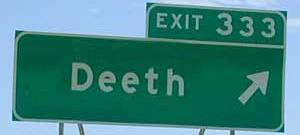Forget about weak explanations for today’s deep political divisions like “the culture of Washington,” gerrymandering...(Tangent: It's less about gerrymandering than about birds of a feather flocking together, or what political demographers call " the big sort," a point which further emphasizes the depth of cultural division. We now return to McAdam and Kloos already in progress:)
...or the rise of cable TV: The civil rights movement, while a victory on many levels, was also the origin of our present morass. It spawned a powerful national “white resistance” countermovement that decisively altered the racial geography of American politics, pushing the national Democratic and Republican parties off center and toward their ideological margins, undermining the centrist policy convergence of the postwar period and setting the parties on the divisive course they remain on today.
Many will blame today’s unprecedented political polarization on recent events, such as the rise of the Tea Party or Obama’s election in 2008, but they will be wrong. The seeds of America’s dysfunction were planted 50 years ago. And the ugly politics of race had everything to do with it.
Delving into the details, Matthew Pulver examines the South's persecution complex and suggests it dates back not just 50 years, but 150:
A sense of persecution has always mingled with the rebellious independence and proud notions of the South’s latent power, the promise that it “will rise again!”That resentment is not just a Southern thing anymore, as this look at the crazy like a fox career of our own Steve King illustrates.
Every major issue is argued in terms of persecution and attack. The racial minority is not the oppressed subaltern but a threat, whether physical or fiscal. Liberatory advances for women and LGBT Americans are assaults upon the family. Religious pluralism and fortifications of the wall between church and state evoke biblical accounts of Christian persecution. Deviations from increasingly neoliberal capitalism are described as authoritarian socialism. Relaxation of military aggression, especially under Obama, is even seen as collusion with the enemy.
There is a problem, though, for the GOP in the 2014 and subsequent elections: Once the Fort Sumter-like salvo of superlatives and hyperbole is launched, it is likely impossible to quiet the fear and anger of the party’s base.
But no one here is a racist, right? Isn't it just about defending the "homeland"? Umm...
Hitler wanted to create an identity that went beyond language and culture. He wanted to invent a "German race," and have Germany be that race's "homeland," all so he could sell to the German people their own racial superiority and use that to justify exterminating others.
So, in 1934, at the Nazi party's big coming-out event, the famous Nuremberg rally, Nazis introduced the term "homeland."
Prior to that, they'd always referred to Germany as "the Fatherland" or "the Motherland" or "our nation."
But Hitler and his think-tank wanted Germans to think of themselves with what he and Goebbels viewed as the semi-tribal passion that the Zionists had for Israel.
So, in that most famous 1934 Nazi rally's opening speech, Rudolph Hess, Hitler's deputy Fuhrer, said that, "Thanks to [Hitler's] leadership, Germany will become the homeland. Homeland for all Germans in the world."
So I'm not the only one who's always been a little creeped out by that word.

No comments:
Post a Comment